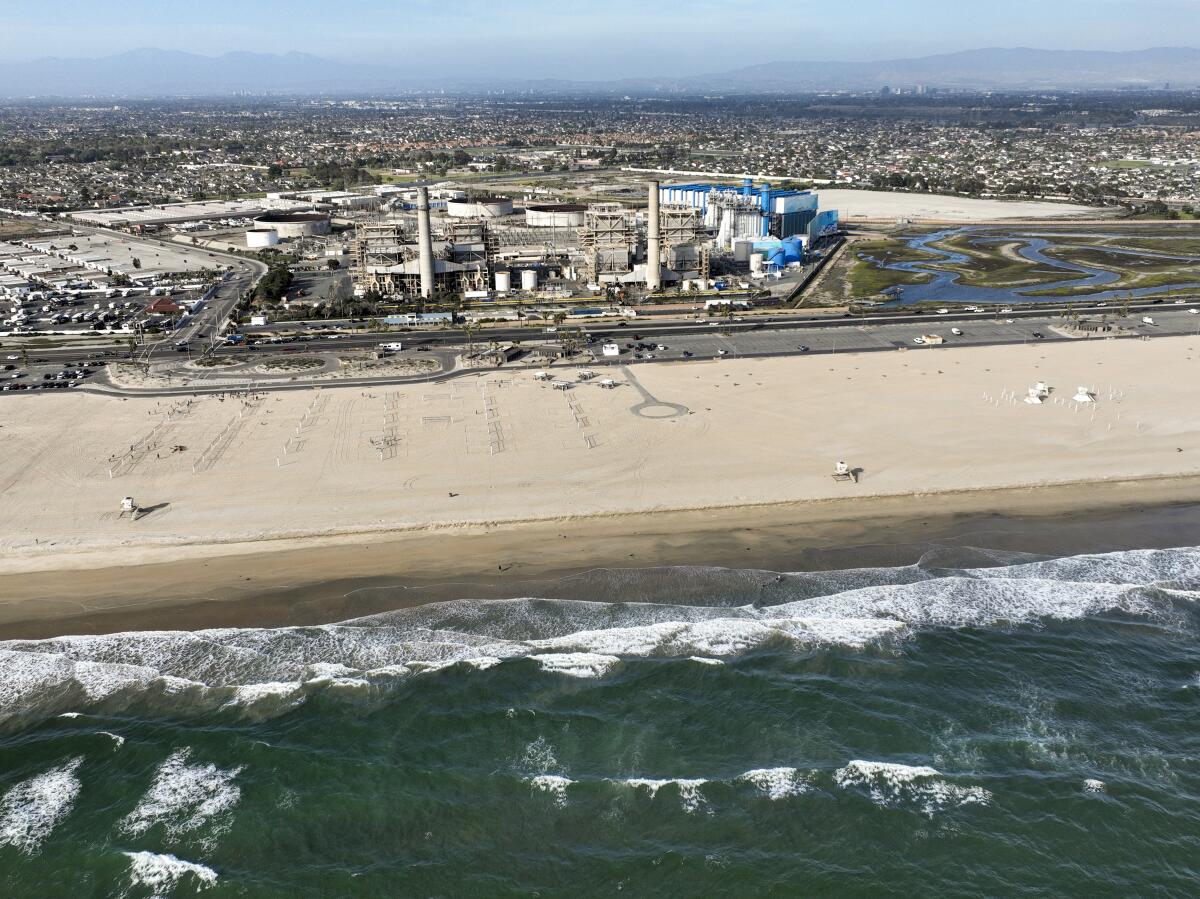Essential California: As some cities face water restrictions, a desalination debate grows

- Share via
Good morning, and welcome to the Essential California newsletter. It’s Friday, April 29. I’m Ian James, the Times’ water reporter, and this is my first time standing in to write this newsletter.
This week has brought a ton of major water-related news, including new restrictions on outdoor watering that will leave many lawns turning brown. Across large portions of Southern California, the restrictions are set to take effect June 1, limiting outdoor watering to one day per week.
The specifics of the new rules will probably vary for each local water supplier, but the upshot is that everyone who lives in the affected areas will be told to set sprinklers and irrigation systems to run for a limited time once a week.
The restrictions were ordered by the Metropolitan Water District of Southern California to address a severe shortage of supplies that come from Northern California through the pumps and canals of the State Water Project. Conditions have been so exceptionally dry that water agencies expect to receive just 5% of their full allocations this year.
California’s extreme drought over the last three years has been intensified by hotter temperatures, putting strains on the shrinking reserves in the state’s reservoirs.
Gloria Gray, chairperson of the MWD’s board, described the severity of the shortage like this: “We knew climate change would stress our water supply, and we’ve been preparing for it, but we did not know it would happen this fast.”
Yet even as the northern third of the MWD’s vast service area faces unprecedented water restrictions, a different sort of struggle is underway in Orange County, where a company’s plan to build a large desalination plant is to face a critical vote next month before the California Coastal Commission.
This week, the agency’s staff recommended that the commission reject the proposed project in Huntington Beach, writing that Poseidon Water’s project “raises significant and complex coastal protection policy issues.” Concerns included flood risks based on updated projections of sea-level rise, the plant’s location in an industrial area with a history of contamination problems, and higher costs for water that would probably mean “significant burdens” for low-income communities.
Officials said in the staff report that since the company first proposed the plant nearly 25 years ago, “our understanding of the severity and consequences of climate change and sea level rise have grown exponentially.” Updated state guidelines, they said, show risks around the site “are much more severe than understood just a few years ago.”
The proposed construction site is also in the Newport-Inglewood Fault Zone, the staff wrote, “and the whole site is underlain with loose sediments that respond easily to ground movement and can liquefy during an earthquake.”
Although Poseidon has proposed to use fill material to elevate the site, the report said, “the surrounding area is at an elevation where regular flooding could occur within a couple decades, and by 2050 to 2070, the surrounding area may be flooded regularly, making access to the site difficult.”
The company has said the desalination plant would be safe from the effects of sea-level rise and other potential hazards.
The Coastal Commission’s staff said “well-planned and sited” desalination plants will probably play a role in helping to develop new, reliable water supplies. But staffers said that in this area of Orange County, there is a “lack of a near-term need for the project” and that other proposed water projects — including wastewater recycling — would be more cost-effective and seem able to address projected demand over the coming decades.
Despite a lack of detailed information on costs, commission staffers said, the water rate hike for the project “would disproportionately impact millions of low-income residents,” and rejecting the proposal “would focus water agencies on developing more cost-effective, energy-efficient, reliable sources of water.”
Opponents of the project praised the staff’s conclusion. Poseidon Water said in a statement that if the recommendation stands, “it will effectively be the death knell for desalination in California.”
The company faces a key vote at a May 12 meeting in Costa Mesa. The Coastal Commission plans to decide whether to approve a coastal development permit, which would allow the company to build the $1.4-billion desalination plant.
Sign up for Essential California
The most important California stories and recommendations in your inbox every morning.
You may occasionally receive promotional content from the Los Angeles Times.
And now, here’s what’s happening across California:
Note: Some of the sites we link to may limit the number of stories you can access without subscribing.
TOP STORIES
California’s attorney general announced a first-of-its kind investigation into the fossil fuel and petrochemical industries for their alleged role in causing and exacerbating a global crisis in plastic waste pollution. Atty. Gen. Rob Bonta said his office has subpoenaed Exxon Mobil Corp. seeking information related to the company’s role in global plastics pollution. Los Angeles Times
A legal claim filed by a former top-ranking L.A. County sheriff’s official offers the first eyewitness account suggesting Sheriff Alex Villanueva lied about his involvement in a cover-up. The filing by Robin Limon, once one of Villanueva’s closest advisors, says she brought a DVD containing a video of a deputy kneeling on a handcuffed inmate’s neck to Villanueva and watched it with him two days after the incident. It also makes allegations about retaliation and other improprieties in the Sheriff’s Department. Los Angeles Times
Millions of California families would receive cash rebates of $200 per person under a plan unveiled by state Senate Democrats in response to rising gas prices and inflation. The proposal contains additional boosts to those enrolled in government assistance programs and subsidies provided to small businesses that could be extended for a decade. Los Angeles Times
L.A. RIOTS: 30 YEARS LATER
Parts of South L.A., battered in the 1992 uprising, have been frozen in time; now, property prices are soaring and gentrification has arrived. Who will benefit? Many longtime residents are being priced out as the underlying structural problems that plagued South L.A. were never meaningfully resolved. Los Angeles Times
Plus: The remarkable but complicated rise of Koreatown since 1992. Los Angeles Times
What went wrong, and what can we learn? A panel convened by Supervisor Holly Mitchell looks back at the lessons and lasting effects of the civil unrest. Los Angeles Sentinel
‘Rodney King was the last straw.’ A DJ recalls the anger behind the uprising. KJLH-FM on Crenshaw Boulevard was the L.A. radio station that rose to a moment of history in 1992. KCRW
At Florence and Normandie, little has changed. Residents and workers around the intersection where anger boiled over 30 years ago say the area is still struggling with inequity, frustration and a lack of investment and resources. LAist
The day L.A. ‘went to war with itself.’ A photo journey. New York Times
CALIFORNIA CHRONICLES
San Francisco turns to rat birth control. Will it make a dent in the rodent population in one of the “rattiest cities in America”? San Francisco Chronicle
Life and death atop Mt. Whitney. One injured, stranded hiker was rescued, but an emergency call led crews to the body of another. Mercury News
A deep look at the fraud and criminal behavior that victimized survivors of a huge wildfire — for a second time. Sacramento Bee
One San Diego neighborhood’s long fight against pollution. For decades, industry and homes have sat side by side in Barrio Logan, a predominantly Chicano community on the working waterfront. San Diego Union-Tribune
CALIFORNIA CULTURE
Netflix began a round of cost-cutting by eliminating an undisclosed number of marketing-related jobs, according to several people who said they were laid off. The reductions come a week after Netflix reported its first subscriber loss in more than a decade. The Los Gatos, Calif.-based streaming service lost 200,000 subscribers in the first quarter and expects to lose even more in the current quarter. Los Angeles Times
Plus: Inside the drama and power clashes at Netflix. Hollywood Reporter
Jason Sudeikis is not pleased with the public spectacle that unfolded when Olivia Wilde received custody papers from him at CinemaCon this week. His ex-fiancée of seven years was handed a yellow envelope onstage in Las Vegas. Los Angeles Times
Holland Taylor’s final bow as Ann Richards. Taylor, 79, first put on her solo play about the former Texas governor in 2010. The Pasadena Playhouse hosted its final run. New York Times
Free online games
Get our free daily crossword puzzle, sudoku, word search and arcade games in our game center at latimes.com/games.
CALIFORNIA ALMANAC
Los Angeles: Mostly sunny, 74. San Diego: Areas of low clouds early; otherwise, mostly sunny, 68. San Francisco: Sunny to partly cloudy; breezy in the afternoon, 65. San Jose: Mostly sunny, 73. Fresno: Sunny, 80. Sacramento: Mostly sunny, 79.
AND FINALLY
Today’s California memory comes from Maria Chaput:
I immigrated to the U.S. in 1991 and settled in California. I took many road trips, immediately falling in love with the windswept beauty of its landscape. I noticed the dichotomy from cool areas to warm deserts, from luxuriant vegetation and crashing surf to snowy mountaintops. When I retired in late 2020, I stayed in Hawaii but quickly ached for the Golden State, where you can just go and be overwhelmed with its conifer forests, giant sequoias and so much more. “California Dreamin’” by The Mamas & The Papas is simply a song about wishing you were in California. I’m no longer wishing because I’m here to stay.
— Maria Chaput
If you have a memory or story about the Golden State, share it with us. (Please keep your story to 100 words.)
Please let us know what we can do to make this newsletter more useful to you. Send comments to essentialcalifornia@latimes.com.
Sign up for Essential California
The most important California stories and recommendations in your inbox every morning.
You may occasionally receive promotional content from the Los Angeles Times.




